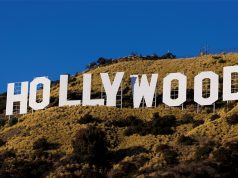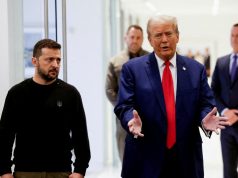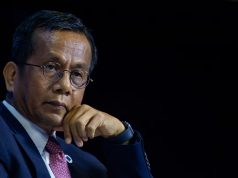
WASHINGTON — U.S. President Joe Biden and President-elect Donald Trump have yet to start the formal transition process between administrations, which normally takes months and involves the executive branch sharing information with incoming officials on everything from foreign policy to ongoing investigations.
Trump, who will be sworn into office on Jan. 20, has not signed a series of transition documents with Biden, preventing U.S. officials working for 15 agencies – including the Treasury, State Department, Energy Department, Agriculture Department, Transportation Department and others – from briefing his incoming team.
The unusual situation could mean hiccups in some government operations, some critics warn and raises questions about whether Trump’s appointees will clear ethics hurdles.
Here’s what we know about what’s going on:
WHY DOES THE TRANSITION MATTER?
It allows the incoming president’s team to participate in national security briefings or gain access to federal agencies to begin the complicated work of preparing to take control of the federal government on Jan. 20, 2025.
WHAT DOCUMENTS HAS TRUMP NOT SIGNED?The Trump team has so far not signed two agreements needed to kick-start the transition required by the Presidential Transition Act: a memorandum of understanding with the General Services Administration and another with the White House.
The GSA agreement would offer the transition team office space, IT services and facilities, and the White House agreement would allow transition team access to employees and documents of federal agencies.
Under the transition law, the agreements also include a robust ethics pledge. It requires Trump and his transition staff to pledge they will avoid conflicts of interest once sworn into office.
Trump’s transition team was required to submit the ethics pledge by Oct. 1, according to the 1963 law that provides transition funding.
WHY HASN’T TRUMP SIGNED THE AGREEMENTS?
Two transition sources with knowledge of the matter said the holdup is Trump having to walk away from his business interests – something he does not want to do.
Three days after winning the election, Trump denied on Truth Social that he was selling his shares in Trump Media & Technology Group DJT.O, the parent company of the social media platform.
“I HAVE NO INTENTION OF SELLING!” he posted.
The Trump transition team’s leadership has privately drafted their own ethics document and a conflict-of-interest statement governing its staff, sources said.
The documents do not meet the requirements of the transition law and do not include language that explains how Trump will address conflicts of interest during his presidency, sources with knowledge of the transition said.
Not signing the documents also means the president does not have to disclose the names of private donors, who are funding his transition, and can raise unlimited amounts of cash from them to fund his return to the White House. The transition law requires these names be disclosed and caps such donations at $5,000.
The Trump transition team has repeatedly said the president-elect intends to sign the documents but the team’s main priority is selecting and vetting candidates. It remains unclear when Trump will sign the pledge.
All transition staff have signed a robust ethics pledge as a requirement of their participation, the transition team said.
“The Trump-Vance transition lawyers continue to constructively engage with the Biden-Harris administration lawyers regarding all agreements contemplated by the Presidential Transition Act,” said Brian Hughes, a Trump transition spokesman.
WHAT DOES THE LAW SAY ABOUT CONFLICTS?
The about $7 trillion annual U.S. federal government budget is funded by American taxpayer money, and people who work in it should not use their position or influence in ways that benefit them or their businesses or families, according to multiple U.S. ethics laws.
In 2019, Congress amended that law to require candidates to create and publicly post an ethics plan before the election. That bipartisan law was born in part out of concerns about ethical issues during the first Trump administration.
WHAT ARE THE CONSEQUENCES?
The president is exempted from conflict of interest laws because he oversees too many areas to make enforcement practical, ethics experts said. The system relies on a president’s good-faith effort to separate his personal interests from the country’s when he takes office.
However the Supreme Court’s ruling this year that Trump, as a former president, is immune from prosecution for official acts within his constitutional authority while in the White House, raised questions about the norms.
WHAT ASSETS DOES TRUMP HAVE?
Trump has a stake valued at $3.76 billion in Trump Media & Technology Group, as well as stakes in a cryptocurrency business, real estate properties and several foreign deals.
The family real estate company, now run largely by Eric Trump, owns a portfolio of hotels, golf courses, resorts and New York City office space, retail operations and condominiums.
WHAT ABOUT SECURITY CLEARANCES?
The Trump transition team has not entered into a memorandum of understanding with the Department of Justice to allow the FBI to conduct background checks of nominees, and it hasn’t sent the FBI the names of prospective national security personnel who would have access to classified information, one of the sources said.
The transition is reportedly using private firms to vet candidates, leaving open the possibility that federal law enforcement may never properly review Trump appointees.
Circumventing background checks would be bucking a long-established norm in Washington, but the president has the final authority on whom he nominates and picks to conduct background checks.
WHAT DID TRUMP DO THE LAST TIME?
In 2017, Trump said he would place his business interests in a trust controlled by his two oldest sons and take other steps to remove any suggestion of a conflict of interest with his decisions as president.
Still, Trump repeatedly came under fire from the Office of Government Ethics, responsible for oversight, for potential conflicts of interest relating to his businesses and brands. The government’s top ethics official, Walter Shaub, resigned and criticized the president six months after Trump entered office.
WHAT DO ETHICS EXPERTS SAY?
Trump could operate with little or no ethics oversight during his second four-year term, making conflicts of interest more possible. It also opens up new ways for foreign interests and corporations to attempt to influence him and his administration’s policy by pouring money into his businesses.
At the end of his first term, at least 20 governments, including Saudi Arabia and China, collectively spent more than $7.8 million at his hotels and golf courses, according to a report compiled by congressional Democrats.
It also severely affects the public’s trust in government, watchdog groups say.
Public trust in government hit some of the lowest levels in over 60 years during Trump’s last administration, when only 17% of Americans trusted the government to do what was right.
—Reporting by Nandita Bose in Washington; Editing by Heather Timmons and Jonathan Oatis









